
WCATY celebrates 30 years of engaging young learners
Andrew Wolfgram’s mother created this quilt from WCATY T-shirts her son collected over the years as a student in the program.
It all started with a Saturday morning class on maple syrup.
It was the late 90s and Andrew Wolfgram was a self-described shy fourth or fifth grader with a penchant for advanced math and science. The Saturday morning maple syrup class was being offered through a University of Wisconsin–Madison youth program called WCATY and for Wolfgram, who today serves as one of its instructors, it would be the start of a lasting involvement with the program.
This year, WCATY (Wisconsin Center for Academically Talented Youth) celebrates 30 years of sparking the curiosity of young minds.
“I’m not sure how my parents initially heard about WCATY,” says Wolfgram, who grew up in Milwaukee. “I attended those Saturday morning classes for a few years and then started with the summer residential programs in middle school. I remember being really nervous when they dropped me off for my first weeklong overnight program — I didn’t want them to leave and I was homesick. But I got over that very quickly and for the next four years, I begged them to go every summer.”
Launched in 1991 thanks to gifts from the Lynde and Harry Bradley Foundation and the Norman Bassett Foundation, WCATY (Wisconsin Center for Academically Talented Youth) was designed as an inclusive intellectual community for young learners. Over the past three decades, its classes and summer programs have challenged students in grades 1–12 with academically rigorous coursework and comprehensive, hands-on exploration of topics ranging from astronomy and computer science to mythology and theater.
More important, the program created a space for students like Wolfgram to feel proud of their passion for learning and meet like-minded friends.
“The classes I took at WCATY as a kid were awesome and allowed me to learn at a pace where I didn’t feel like I had to hold myself back,” he recalls. “But it was the social aspect that kept me coming back. Having this intense summer experience with the same kids year after year created lifelong friendships for me. In recent years I’ve been to the weddings of several friends I met there.”
Unapologetically themselves
Today, WCATY’s four core programs — GEM, PACE, STEP and ALP — are housed within Badger Precollege, UW–Madison’s home for academic programs for young students.

Grouped by age for learners in elementary, middle and high school, Badger Precollege programs aim to help intellectually curious students explore their interests, meet new friends and prepare for the college experience. Online and in-person classes are taught by qualified educators, UW faculty and staff, and former graduates like Wolfgram, who has worked with the program in a variety of roles since graduating from high school. He currently teaches Adventures in Coding for the Winter GEM program, which is offered entirely online due to the pandemic.
“The virtual classes are different from our usual in-person classes, but it’s actually translated well for my computer science class,” says Wolfgram. “The students have been really amazing and are still getting deep engagement with the subject, and we’re able to split into small groups for personalized interactions.”
While designed to challenge students academically, classes also continue WCATY’s goal of providing a space for students to have serious fun and feel safe and comfortable being who they are.
Wolfgram recognizes this same passion for learning and sense of community that he experienced when he was a student in the program.
“These classes offer a place for curious kids to be unapologetically themselves,” Wolfgram explains. “Being a kid who loves learning is not always popular in school, but here they have a family who shares their interests. I see this in my students, who continue to be really open and excited about connecting through learning.”
New opportunities, rooted in tradition
Though some Badger Precollege classes have been taught online in the past (and some, like Badger Precollege Online, are offered only virtually), the pandemic brought a quick shift to fully online learning, at least for the time being.
Program director Olha Skyba, who has been with WCATY since 2009, says that while she is eager to return to in-person programming when it’s safe, the virtual learning environment is a natural part of the precollege evolution.
“Our programs are resilient,” Skyba notes. “They’ve been around for 30 years, and if anything, we hope online learning opportunities can help us reach more students around the world. Those kinds of global connections will only make the experience richer for all students.”
Even with this year’s many unexpected changes, Badger Precollege has managed to keep some aspects of its programming the same. Like Wolfgram, many instructors who have taught in-person classes for years are returning to teach online, providing greater continuity for students. Social activities and college prep workshops also continue, offering learners the opportunity to build meaningful friendships and get a feel for college.
No matter the learning format, Wolfgram sees great reasons for students to participate.
“It’s a great, low-risk way to explore subjects you won’t learn about in school,” Wolfgram explains. “There are classes in paleontology, artificial intelligence and law — it’s so cool! Where else can you do that?”
And even if you discover a subject isn’t “your thing,” he adds, students are still going to have fun.
“There are so many activities incorporated. It’s a very dynamic experience you can’t experience anywhere else. And it’s nice to be around people who love learning.”
For questions about Badger Precollege, please email [email protected]. Or join our mailing list for information and updates about our programs.



